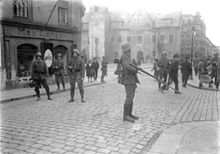Proletarian Hundreds
The proletarian hundreds were a communist- dominated paramilitary movement in the early 1920s . In 1923 they played a central role in the attempted communist coup in Saxony and Thuringia and were then banned.
organization
The members came from supporters and members of both the Communist Party of Germany and the Social Democratic Party of Germany and the free trade unions . In total, they had 50,000 to 60,000 members. In most cases, however, the leadership lay with representatives of the KPD. The Hundreds were usually not armed with firearms. Walking sticks, wooden slats or similar objects were used in violent clashes with supporters of the NSDAP . However, in the event of an emergency, the hundreds had illegal weapons depots. For the leadership of the KPD, the Hundreds were units for the implementation of their revolutionary goals. TheThe Comintern supported the organization with funds and the deployment of military experts.
German October
This was particularly evident in the run-up to the so-called German October. In the Free State of Saxony , the Hundreds were recognized by the government under Erich Zeigner , in which the communists were also involved. There they were subsequently expanded quickly. In the Free State of Prussia were Interior Minister Carl Severing banned in May 1923rd
In Saxony and Thuringia, the hundreds began extensive field exercises in August 1923 and test alarms took place. In October 1923 the Reich Commissioner for Public Order Monitoring warned that the real goal of the hundreds was to eliminate the existing form of government. In addition to the pursuit of weapons, they have set up a military-organized message and courier system.
resolution
On October 13, 1923, the Hundreds were also banned for Saxony by Lieutenant General Alfred Müller , who had held the executive power in Saxony since September. After the Reichswehr invaded Saxony and Thuringia, the units were disarmed and disbanded. The proletarian hundreds were indirect forerunners of the Red Front Fighter League .
literature
- Heinrich August Winkler : From Revolution to Stabilization. Workers and the labor movement in the Weimar Republic. 1918-1924 . Dietz, Berlin 1984, ISBN 3-8012-0093-0 ( History of the Workers and the Labor Movement in Germany since the End of the 18th Century 9), pp. 620f., 625, 649f., 671.
